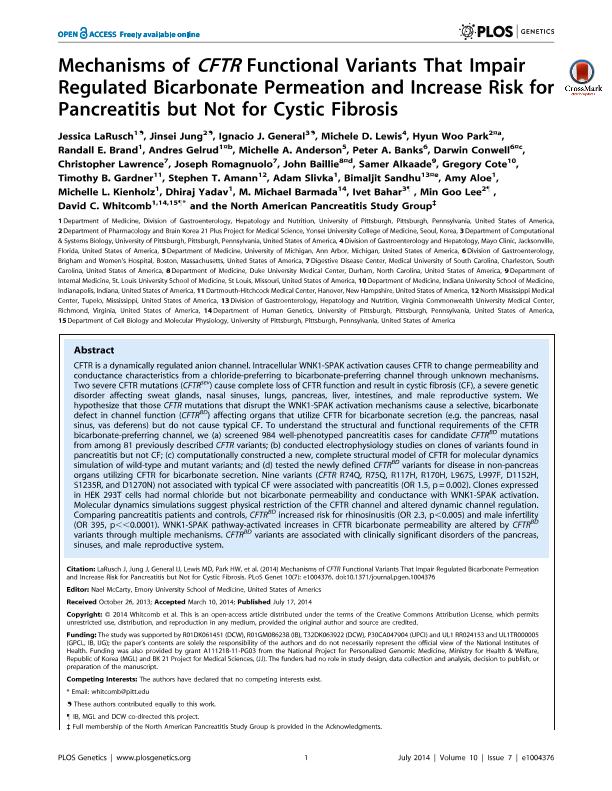Artículo
Mechanisms of CFTR Functional Variants That Impair Regulated Bicarbonate Permeation and Increase Risk for Pancreatitis but Not for Cystic Fibrosis
LaRusch, Jessica; Jung, Jinsei; General, Ignacio ; Lewis, Michele D.; Park, Hyun Woo; Brand, Randall E.; Gelrud, Andres; Anderson, Michelle A.; Banks, Peter A.; Conwell, Darwin; Lawrence, Christopher; Romagnuolo, Joseph; Baillie, John; Alkaade, Samer; Cote, Gregory; Gardner, Timothy B.; Amann, Stephen T.; Slivka, Adam; Sandhu, Bimaljit; Aloe, Amy; Kienholz, Michelle L.; Yadav, Dhiraj; Barmada, M. Michael; Bahar, Ivet; Lee, Min Goo; Whitcomb, David C.; North American Pancreatitis Study Group
; Lewis, Michele D.; Park, Hyun Woo; Brand, Randall E.; Gelrud, Andres; Anderson, Michelle A.; Banks, Peter A.; Conwell, Darwin; Lawrence, Christopher; Romagnuolo, Joseph; Baillie, John; Alkaade, Samer; Cote, Gregory; Gardner, Timothy B.; Amann, Stephen T.; Slivka, Adam; Sandhu, Bimaljit; Aloe, Amy; Kienholz, Michelle L.; Yadav, Dhiraj; Barmada, M. Michael; Bahar, Ivet; Lee, Min Goo; Whitcomb, David C.; North American Pancreatitis Study Group
 ; Lewis, Michele D.; Park, Hyun Woo; Brand, Randall E.; Gelrud, Andres; Anderson, Michelle A.; Banks, Peter A.; Conwell, Darwin; Lawrence, Christopher; Romagnuolo, Joseph; Baillie, John; Alkaade, Samer; Cote, Gregory; Gardner, Timothy B.; Amann, Stephen T.; Slivka, Adam; Sandhu, Bimaljit; Aloe, Amy; Kienholz, Michelle L.; Yadav, Dhiraj; Barmada, M. Michael; Bahar, Ivet; Lee, Min Goo; Whitcomb, David C.; North American Pancreatitis Study Group
; Lewis, Michele D.; Park, Hyun Woo; Brand, Randall E.; Gelrud, Andres; Anderson, Michelle A.; Banks, Peter A.; Conwell, Darwin; Lawrence, Christopher; Romagnuolo, Joseph; Baillie, John; Alkaade, Samer; Cote, Gregory; Gardner, Timothy B.; Amann, Stephen T.; Slivka, Adam; Sandhu, Bimaljit; Aloe, Amy; Kienholz, Michelle L.; Yadav, Dhiraj; Barmada, M. Michael; Bahar, Ivet; Lee, Min Goo; Whitcomb, David C.; North American Pancreatitis Study Group
Fecha de publicación:
07/2014
Editorial:
Public Library of Science
Revista:
Plos Genetics
ISSN:
1553-7390
Idioma:
Inglés
Tipo de recurso:
Artículo publicado
Clasificación temática:
Resumen
CFTR is a dynamically regulated anion channel. Intracellular WNK1-SPAK activation causes CFTR to change permeability and conductance characteristics from a chloride-preferring to bicarbonate-preferring channel through unknown mechanisms. Two severe CFTR mutations (CFTRsev) cause complete loss of CFTR function and result in cystic fibrosis (CF), a severe genetic disorder affecting sweat glands, nasal sinuses, lungs, pancreas, liver, intestines, and male reproductive system. We hypothesize that those CFTR mutations that disrupt the WNK1-SPAK activation mechanisms cause a selective, bicarbonate defect in channel function (CFTRBD) affecting organs that utilize CFTR for bicarbonate secretion (e.g. the pancreas, nasal sinus, vas deferens) but do not cause typical CF. To understand the structural and functional requirements of the CFTR bicarbonate-preferring channel, we (a) screened 984 well-phenotyped pancreatitis cases for candidate CFTRBD mutations from among 81 previously described CFTR variants; (b) conducted electrophysiology studies on clones of variants found in pancreatitis but not CF; (c) computationally constructed a new, complete structural model of CFTR for molecular dynamics simulation of wild-type and mutant variants; and (d) tested the newly defined CFTRBD variants for disease in non-pancreas organs utilizing CFTR for bicarbonate secretion. Nine variants (CFTR R74Q, R75Q, R117H, R170H, L967S, L997F, D1152H, S1235R, and D1270N) not associated with typical CF were associated with pancreatitis (OR 1.5, p = 0.002). Clones expressed in HEK 293T cells had normal chloride but not bicarbonate permeability and conductance with WNK1-SPAK activation. Molecular dynamics simulations suggest physical restriction of the CFTR channel and altered dynamic channel regulation. Comparing pancreatitis patients and controls, CFTRBD increased risk for rhinosinusitis (OR 2.3, p<0.005) and male infertility (OR 395, p<<0.0001). WNK1-SPAK pathway-activated increases in CFTR bicarbonate permeability are altered by CFTRBD variants through multiple mechanisms. CFTRBD variants are associated with clinically significant disorders of the pancreas, sinuses, and male reproductive system.
Palabras clave:
Cystic Fibrosis
,
Pancreatitis
,
Molecular Modelling
,
Ion Channel
Archivos asociados
Licencia
Identificadores
Colecciones
Articulos(SEDE CENTRAL)
Articulos de SEDE CENTRAL
Articulos de SEDE CENTRAL
Citación
LaRusch, Jessica; Jung, Jinsei; General, Ignacio; Lewis, Michele D.; Park, Hyun Woo; et al.; Mechanisms of CFTR Functional Variants That Impair Regulated Bicarbonate Permeation and Increase Risk for Pancreatitis but Not for Cystic Fibrosis; Public Library of Science; Plos Genetics; 10; 10; 7-2014; 1-15; e1004778
Compartir
Altmétricas



